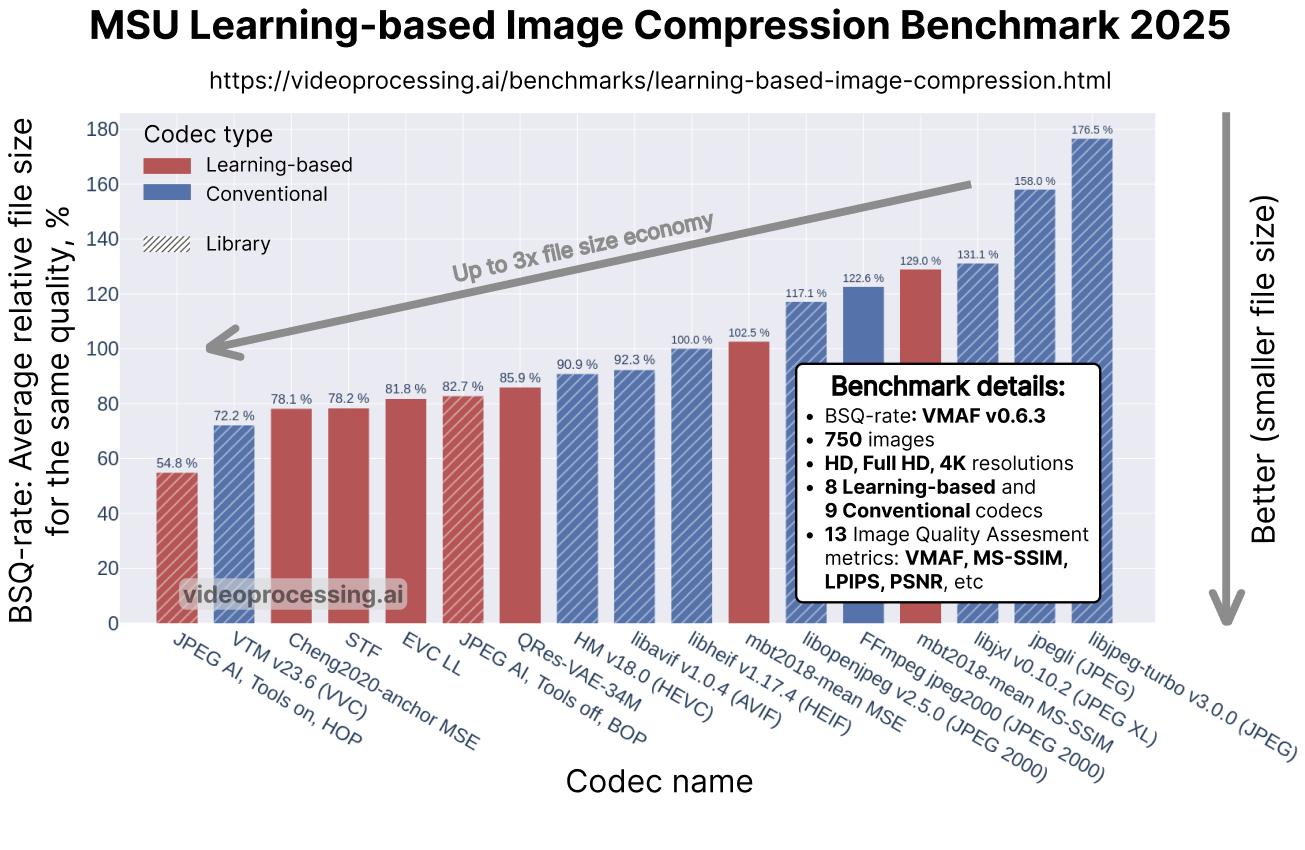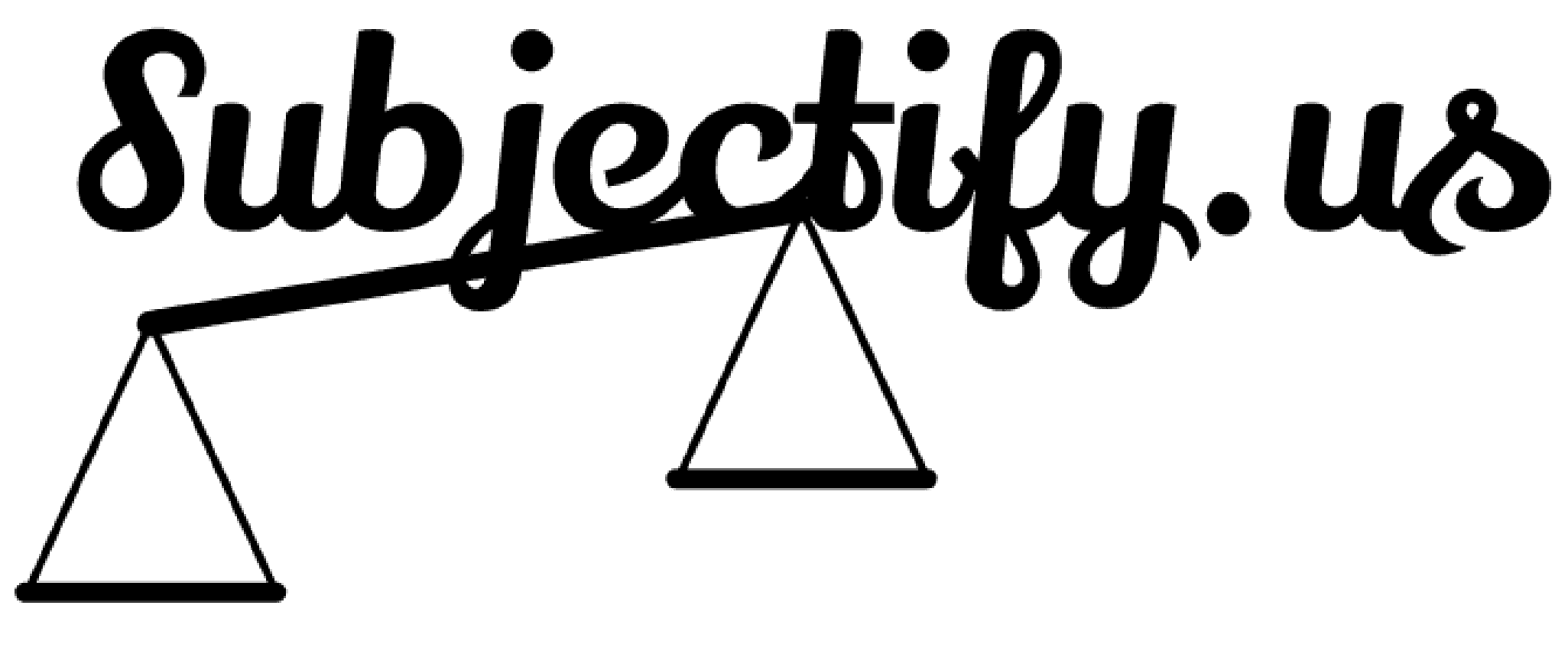MSU Learning-based Image Compression Benchmark 2024
Explore the Best Learned Image Compression Methods
G&M Lab head: Dr. Dmitriy Vatolin
Project adviser: Dr. Dmitriy Kulikov
Measurements, analysis:
Vitaly Rylov
Roman Kazantsev
Roman Kazantsev

Diverse dataset
- Over 750 test images
- HD, Full HD and 4K resolutions
- Various content types
- Processed over 1M images to create the dataset
Large comparison
- 20 codecs tested
- 13 IQA metrics
- Subjective comparison (soon)
- JPEG AI reference codec results
Large leaderboard
- BSQ-rate for codec ranking
- Rate-Distortion curves
What’s new
- 14.04.2024 Benchmark Release!
- 14.02.2025 Added Jpeg AI.
Leaderboard
RD-curve examples
Cite us
|
@misc{rylov2024learning
title={Learning-based Image Compression Benchmark},
author={Rylov, Vitaly and Kazantsev, Roman and Vatolin, Dmitriy},
year={2024},
url={https://videoprocessing.ai/benchmarks/learning-based-image-compression.html}
}
|
Contacts
We would highly appreciate any suggestions and ideas on how to improve our benchmark.
Please contact us via e-mail: image-compression-benchmark@videoprocessing.ai.
Also, you can subscribe to updates on our benchmark:
MSU Video Quality Measurement Tool
Widest Range of Metrics & Formats
- Modern & Classical Metrics SSIM, MS-SSIM, PSNR, VMAF and 10+ more
- Non-reference analysis & video characteristics
Blurring, Blocking, Noise, Scene change detection, NIQE and more
Fastest Video Quality Measurement
- GPU support
Up to 11.7x faster calculation of metrics with GPU - Real-time measure
- Unlimited file size
Main MSU VQMT page on compression.ru

Crowd-sourced subjective
quality evaluation platform
- Conduct comparison of video codecs and/or encoding parameters
What is it?
Subjectify.us is a web platform for conducting fast crowd-sourced subjective comparisons.
The service is designed for the comparison of images, video, and sound processing methods.
Main features
- Pairwise comparison
- Detailed report
- Providing all of the raw data
- Filtering out answers from cheating respondents
Subjectify.us
See Also
PSNR and SSIM: application areas and criticism
Learn about limits and applicability of the most popular metrics
Super-Resolution Quality Metrics Benchmark
Discover 50 Super-Resolution Quality Metrics and choose the most appropriate for your videos
Super-Resolution Quality Metrics Benchmark
Discover 50 Super-Resolution Quality Metrics and choose the most appropriate for your videos
Video Colorization Benchmark
Explore the best video colorization algorithms
Video Saliency Prediction Benchmark
Explore the best video saliency prediction (VSP) algorithms
LEHA-CVQAD Video Quality Metrics Benchmark
Explore newest Full- and No-Reference Video Quality Metrics and find the most appropriate for you.
Site structure
-
MSU Benchmark Collection
- Super-Resolution Quality Metrics Benchmark
- Super-Resolution Quality Metrics Benchmark
- Video Colorization Benchmark
- Video Saliency Prediction Benchmark
- LEHA-CVQAD Video Quality Metrics Benchmark
- Learning-Based Image Compression Benchmark
- Super-Resolution for Video Compression Benchmark
- Defenses for Image Quality Metrics Benchmark
- Deinterlacer Benchmark
- Metrics Robustness Benchmark
- Video Upscalers Benchmark
- Video Deblurring Benchmark
- Video Frame Interpolation Benchmark
- HDR Video Reconstruction Benchmark
- No-Reference Video Quality Metrics Benchmark
- Full-Reference Video Quality Metrics Benchmark
- Video Alignment and Retrieval Benchmark
- Mobile Video Codecs Benchmark
- Video Super-Resolution Benchmark
- Shot Boundary Detection Benchmark
- The VideoMatting Project
- Video Completion
- Codecs Comparisons & Optimization
- VQMT
- MSU Datasets Collection
- Metrics Research
- Video Quality Measurement Tool 3D
- Video Filters
- Other Projects

